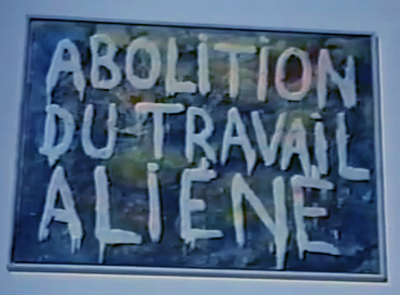Thanks to the wonders of speeded-up-and-outsourced-to-India editorial production the article has appeared online in advance of the print version. The full version can be read and downloaded here.
Here's some snazzy highlights from it:
"It is this conjunction and changed value production that bringing together psychogeography and class composition analysis in a more concerted way can help to address. The Situationists investigated ways that the accumulation of capital transformed the environments on multiple levels, from the physical shaping of space to the mental and emotional environments. When capital has extended its circuits of valorization through the city in much more pronounced ways, for instance by orienting around creative industries and city policies, the shaping of the city is embedded directly within the changing circuits of capital accumulation…
The purpose of bringing together autonomist class composition analysis and psychogeography would be to develop an approach for drifting through and understanding the new territories of value accumulation in the city configured as a factory space. What are the possibilities for political recomposition within these circuits? If capital is drawing from an expanded terrain of value production that relies upon immense amounts of free labor, what possibilities are there for disrupting accumulation within these spaces? And perhaps even more importantly (even if somewhat dispiritingly), what the processes and dynamics that are blocking moments of political recomposition? While there has been a great deal of discussion about the inherent radicality and social cooperation found within some forms of immaterial labor, often it seems that these have not led to the kind of political outcomes or collectivity emerging from them that one might have expected. The basin of immaterial labor, far from bursting forth with new communist militants, rather seem to be inhabited by people who might seem to be characterized by high degree of possessive individualism, more concerned about the nature of their practice, and with the very real questions of surviving within the challenging conditions of the city itself, more so then with questions of collective conditions of struggles. Perhaps it might be that their position within circuits of labor and reproduction tends to block, or preclude forms of collectivity from emerging, as Franco ‘Bifo’ Berardi has suggested. But if this the case, then what is needed is a closer investigation of the dynamics through which these blockages occur in order to sabotage the process…
What is clear from these brief examples is that the forms that political recomposition would take within the metropolitan factory are significantly different from those employed within industrial struggles previously. Organizing around arts and cultural labor, in circuits of immaterial work, would necessitate a different approach – in the same way the call for a general strike might not be the best tactic for precarious workers. The conditions of creative labor within the metropolis are often times extremely individualizing and isolating, where freelance workers find themselves moving from café to café, project to project, with no common space that they encounter others facing the similar conditions. The purposes of bringing together psychographic drifts with class composition analysis is not to propose in advance any particular tactics for countering these conditions – rather it is to suggest that not enough is known about the particularities and compositions of these situations – and that any radical politics worthy of the name must begin from working within and against them…
In one of the few exhibitions staged by the Situationists Guy Debord wrote over the painting of fellow SI member Pinot Gallizio, “Abolition du travail aliene” (Abolition of alienated labor). Mikkel Bolt Rasmussen argues that this could serve as a bit of mantra for the SI, that the creativity “the artist was endowed with in bourgeois society had to be set free and generalized.” In this sense it was not all that paradoxical that the SI both celebrated and despised the role of the artist. It was not so much that they were opposed to the existence of creative practice, play, or imagination at all – for this is exactly what they wanted to expand all throughout everyday life in revolutionary directions. But this is precisely their objection to the restricted role of creativity within the figure of the artist (although the same could be said of the restrictive role of the creative class or cultural industries). For the SI art had to be realized throughout the everyday and not just within the separate realm of the art world.
In the conditions of neoliberal post-Fordist capitalism fuelled by creativity, play, and desire, art has indeed moved beyond the separate realm of the art world. Unfortunately the effects of this artistic sublation have been somewhat less then liberatory. In these conditions it no longer makes sense to make recourse to play and creativity in the same way, assuming that liberating them will drastically transform everyday life. In reality it is precisely a continued attachment to such claims that may bind people even tighter to their own domination. The task of finding new methods for contesting neoliberal capitalism starts not from continually recycling the ideas of previous revolutionary movements without adapting them to the current conditions. Rather it starts from understanding how the demands of previous movements have shifted patterns of life and labor – and by drifting through this metropolitan factory and its circuits of valorization, finds new ways to sabotage these very circuits.



No comments:
Post a Comment